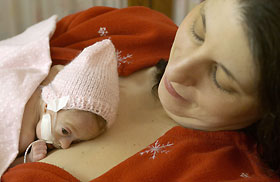For more archives, go to the Advance Archive/Search Page.
Study Explores Calming Effect
Of Close Mother-Baby Contact
When a new mother holds her baby close to her chest, it calms the baby. Art Engler, assistant professor of nursing, wants to know how that closeness affects the mother.

|
|
Kim Dorman of Newington holds her prematurely born daughter Nicole at the Health Center's neonatal intensive care unit. The skin to
skin contact, known as "kangaroo care", is the focus of a current study.
Photo by Peter Morenus
|
"'Kangaroo care' - holding a diaper-clad baby close, skin to skin and chest to chest - has been studied for its calming effect on babies," says Engler, an assistant professor of nursing. "Now we are hoping to see what effect kangaroo care has on the mother's level of stress, and possibly on post-partum depression."
Engler is working with the staff of the Neonatal Intensive Care Unit at the Health Center to study the physiological response of new mothers while they provide kangaroo care to their premature newborns. The mother holds the baby on her chest, skin touching skin, for two hours. Engler tests the mother's saliva before, during and after the session to measure cortisol, a stress hormone. Using a small sensor, he also continuously records the mother's fingertip temperature while she is holding her baby. In addition, the mother answers questions about her reactions to sights and sounds around her; her baby's appearance and behavior; and changes in how she perceives her role as a parent.
"These measures give us a pretty accurate gauge of the mother's stress level while she is holding her baby," says Engler. The results are compared with those of a control group of mothers who talk to and touch their baby while the baby is lying in the bassinet, or isolette, for the two-hour study period.
For Kim and Jeff Dorman, whose baby Nicole was born prematurely, weighing 1 pound, 7 ounces, kangaroo care has been a wonderful experience. They started kangaroo care two weeks after their baby was born. "At first, I was very nervous. She was so little and we weren't sure how she would tolerate it," says Kim Dorman. The baby took to it right away. "She would lie calmly on my chest and fall asleep almost instantly. It was wonderful. I feel I am getting to know her and what she likes."
The parents now take turns holding the baby skin to skin each day. "If you only touch her while she is in the isolette, it seems like she's so delicate," says Jeff Dorman. "Once you hold her outside of the isolette, you aren't so afraid. You begin to realize that she's not so fragile."
Dorothy Vittner, educational development specialist for the Neonatal Intensive Care Unit, says there's a lot of research that supports the concept of kangaroo care for premature babies. "It relaxes them. It helps stabilize the babies' heart and breathing rates, and it shortens the amount of time they spend in the hospital," Vittner says. "We encourage it with parents of premature babies, and even for babies born full-term."
In addition to studying whether kangaroo care has the same beneficial effect on the mother as it does on the baby, Engler plans to study its effect on fathers. "Our goal is to see if kangaroo care can be used as an intervention for stressed or nervous parents - both mothers and fathers - and possibly for post-partum depression."

